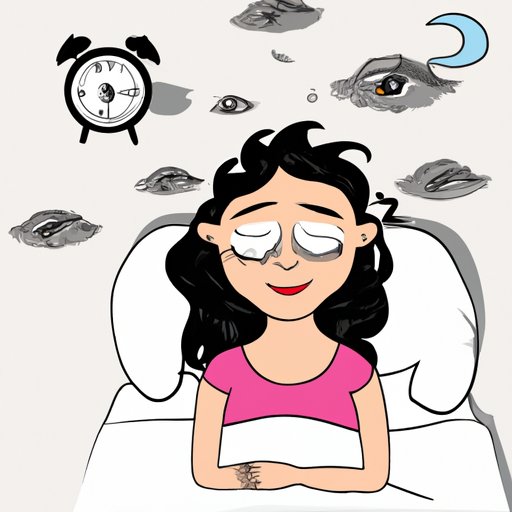Introduction
Do you ever feel like you’re sleeping all day and still feeling exhausted? Excessive daytime sleepiness (EDS) is a common problem that affects millions of people worldwide. While occasional bouts of EDS are normal, chronic or long-term EDS can be a sign of an underlying health issue. In this article, we’ll explore the causes of excessive daytime sleepiness and strategies for combating it.

Exploring the Causes of Excessive Daytime Sleepiness
There are many potential causes of excessive daytime sleepiness, including poor diet and lack of exercise, stress and anxiety, medical conditions, and medications. Let’s take a closer look at each of these in turn.
Poor Diet and Lack of Exercise
Eating unhealthy foods and not getting enough physical activity can lead to fatigue and excessive daytime sleepiness. Eating a balanced diet with plenty of fruits and vegetables will help ensure that your body gets the nutrients it needs to stay energized throughout the day. Regular exercise also helps boost energy levels by releasing endorphins, which are natural mood enhancers. Aim to get at least 30 minutes of physical activity each day.
Stress and Anxiety
Stress and anxiety can cause difficulty sleeping at night and excessive daytime sleepiness. It’s important to find healthy ways to manage stress and anxiety so that you can get a good night’s rest. Practices such as deep breathing, yoga, and meditation can be helpful in reducing stress and anxiety levels. Additionally, talking to a counselor or therapist can help you learn healthy coping skills for managing stress and anxiety.
Medical Conditions
Certain medical conditions, such as sleep apnea, narcolepsy, and thyroid disorders, can cause excessive daytime sleepiness. If you suspect that you may have one of these conditions, it’s important to talk to your doctor and get a proper diagnosis. Your doctor can determine the best course of treatment for your condition.
Medications
Certain medications, such as antidepressants, antihistamines, and beta blockers, can cause drowsiness and fatigue. If you’re taking any of these medications, it’s important to talk to your doctor about the possible side effects and to discuss alternatives if necessary.
How to Combat Daytime Sleepiness and Get a Good Night’s Rest
If you’re struggling with excessive daytime sleepiness, there are steps you can take to combat it and get a better night’s rest. Here are a few tips:
Eat Healthy Foods and Exercise Regularly
Eating a healthy, balanced diet and getting regular exercise will help keep your energy levels up throughout the day. Eating plenty of fruits and vegetables and limiting processed foods, sugar, and caffeine will give your body the nutrients it needs to stay energized. Exercise also releases endorphins, which can improve your mood and help you sleep better at night.
Manage Stress and Anxiety
Finding healthy ways to manage stress and anxiety is essential for getting a good night’s rest. Deep breathing, yoga, and meditation can all be helpful in reducing stress and anxiety levels. Additionally, talking to a counselor or therapist can help you learn healthy coping skills for managing stress and anxiety.
Consult with Your Doctor
If you’ve tried making lifestyle changes but are still struggling with excessive daytime sleepiness, it’s important to talk to your doctor. Your doctor can determine if there is an underlying medical condition causing your EDS and provide the best treatment options.
The Benefits of Adequate Sleep for Improved Health and Well-Being
Getting adequate sleep is essential for good health and well-being. Not only does it help your body rest and recover, but it also has numerous other benefits. Adequate sleep can improve concentration and memory, boost your mood, and increase overall well-being.
Understanding the Negative Consequences of Chronic Daytime Sleepiness
Chronic daytime sleepiness can have a number of negative consequences, such as decreased productivity and increased risk of injury. It’s important to address the underlying cause of your EDS in order to avoid these negative consequences.

Strategies to Help You Wake Up Refreshed and Energized
If you’re struggling with excessive daytime sleepiness, here are a few strategies to help you wake up refreshed and energized:
Establish a Sleep Routine
Having a consistent sleep routine can help you get a good night’s rest. Try to go to bed and wake up at the same time every day, even on weekends. Avoid using electronic devices before bed and create a relaxing pre-bedtime ritual, such as reading a book or taking a warm bath.
Make Lifestyle Changes
Making healthy lifestyle changes can help reduce fatigue and improve sleep quality. Eating a healthy diet and getting regular exercise can help increase energy levels and reduce stress and anxiety. Additionally, avoiding caffeine, alcohol, and nicotine close to bedtime can help ensure that you get a good night’s rest.
Seek Professional Help
If you’ve tried making lifestyle changes but are still struggling with excessive daytime sleepiness, it’s important to talk to your doctor. Your doctor can determine if there is an underlying medical condition causing your EDS and provide the best treatment options.
Conclusion
Excessive daytime sleepiness can be caused by a variety of factors, including poor diet and lack of exercise, stress and anxiety, medical conditions, and medications. Making healthy lifestyle changes and establishing a consistent sleep routine can help reduce fatigue and improve sleep quality. Additionally, it’s important to consult with your doctor if you’re still struggling with EDS after trying lifestyle changes. With the right strategies and support, you can wake up refreshed and energized each morning.


